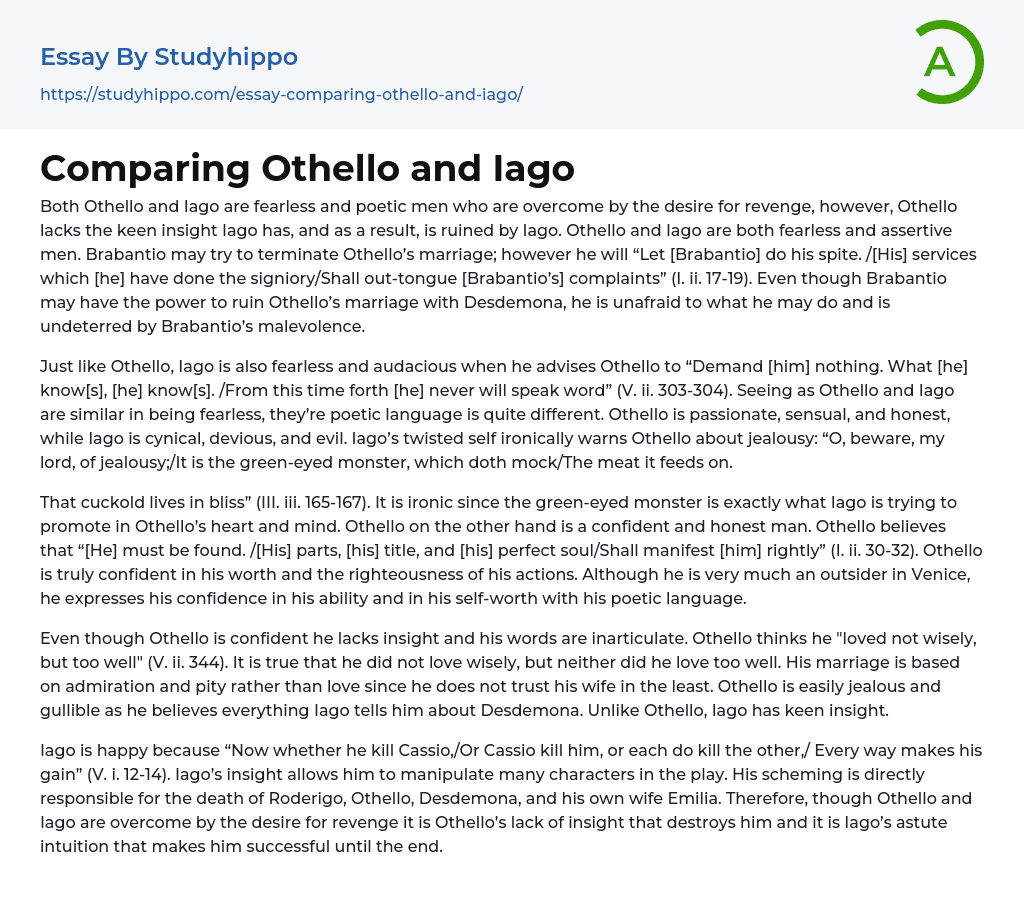Both Othello and Iago are articulate, courageous characters motivated by their revengeful tendencies. However, the downfall of Othello is triggered by his deficient discernment skills, which starkly contrasts with Iago's shrewd intelligence. They both exhibit boldness and assertiveness. No matter how hard Brabantio attempts to interfere in Othello's marital alliance, the latter remains prepared to face him bravely. He fully relies on his record of loyal service and confidently proclaims that it will outweigh Brabantio's opposition when he declares, "Let him do his worst. The services I have performed for the state will counter his complaints"(I. ii. 17-19). Therefore, irrespective of any influence Brabantio may possess to destabilize his union with Desdemona; Othello stays resolute and unfazed against Brabantio’s aggression.
Much like Othello, Iago too displays a prominent fearlessness and boldness when he
...suggests to Othello to “Ask [him] nothing. What [he] realizes, [he] comprehends. /From now on [he] will remain silent” (V.ii. 303-304). Even though Othello and Iago share a similar trait of fearlessness, their expressions through the medium of poetic language are vastly different. Othello's character is vibrant, sensual, and sincere, contrasting starkly with Iago who is rather pessimistic, crafty, and malevolent. Iago ironically advises Othello about the perils of jealousy in his twisted manner: “O, be cautious, my lord, of jealousy;/ It is the green-eyed monster, which ridicules/The food it thrives on."
The contented husband lives in a state of blissful ignorance (III. iii. 165-167). Iago, however, intends to stir up Othello's dormant "beast of jealousy". Contrarily, Othello epitomizes trustworthiness and self-assurance. He remains unshakeable in his conviction that "[He] will be acknowledged. /[His] characteristics, [his] status, and
[his] virtuous soul/Will clearly reveal [him]" (I. ii. 30-32). He has unwavering faith in his worth and the morality of his deeds. Even as an outsider in Venice, he exudes confidence about his capabilities and exhibits self-esteem through potent speech.
Despite his self-assured nature, Othello struggles with understanding and expressing his thoughts coherently. He maintains that his affection was more impassioned than reasonable, evidenced by the phrase "loved not wisely, but too well" (V. ii. 344). Still, it's challenging to label his love as sound or overly fervid. His marriage appears to be built more on esteem and sympathy rather than genuine love, given his doubts concerning his spouse. His inclination towards jealousy and easily manipulated nature make him an effortless target for Iago's manipulations; a stark juxtaposition against Iago's keen judgment.
Iago feels triumphant as he contemplates, “Now whether he kill Cassio,/Or Cassio kill him, or each do kill the other,/ Every way makes his gain” (V. i. 12-14). His clever stratagems manipulate multiple characters within the drama, directly leading to the demise of Roderigo, Othello, Desdemona, and his own wife Emilia. Hence, even though both Othello and Iago are driven by vengeance, it is Othello's deficiency in discernment which leads to his destruction, while it is Iago's sharp acumen that enables him to achieve success until the very end.
- Othello Jealousy essays
- A Doll's House essays
- A Midsummer Night's Dream essays
- A raisin in the sun essays
- A Streetcar Named Desire essays
- An Inspector Calls essays
- Death of a salesman essays
- Everyman essays
- Fences essays
- Hamlet essays
- Hedda Gabler essays
- Iago essays
- King Lear essays
- Macbeth essays
- Much ado about nothing essays
- Oedipus Rex essays
- Oedipus The King essays
- Othello essays
- Pygmalion essays
- Romeo And Juliet essays
- Tartuffe essays
- The glass menagerie essays
- The Importance of Being Earnest essays
- The Merchant Of Venice essays
- The Taming of The Shrew essays
- Twelfth Night essays
- Waiting For Godot essays




